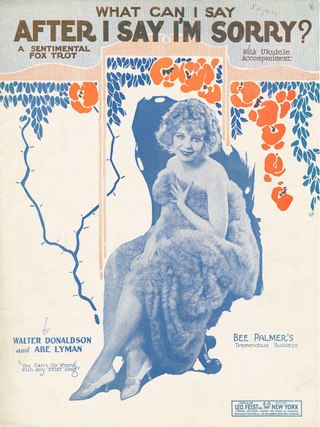Related Research Articles
"Can Anyone Explain? " is a popular song written by Bennie Benjamin and George David Weiss and published in 1950.
"Thinking of You" is a popular song, composed by Harry Ruby with lyrics by Bert Kalmar. It was introduced in the Broadway show, The Five O'Clock Girl (1927) when it was sung by Mary Eaton and Oscar Shaw.
"My Dreams Are Getting Better All the Time" is a 1945 popular song.
"The One I Love (Belongs to Somebody Else)" is a popular song composed by Isham Jones with lyrics by Gus Kahn. The song was recorded by Isham Jones' Orchestra on December 21, 1923, at Brunswick Studios in New York City, and published on January 7, 1924. On January 17 in Chicago, Jones recorded another version, with Al Jolson on lead vocals. Both versions made the charts that Spring, with Jolson's peaking at number 2, and Jones' at number 5. Sophie Tucker recorded her version February 1924, released on Okeh 40054.
"It Could Happen to You" is a popular standard with music by Jimmy Van Heusen and lyrics by Johnny Burke. The song was written in 1943 and was introduced by Dorothy Lamour in the Paramount musical comedy film And the Angels Sing (1944).
"I Had the Craziest Dream" is a popular song which was published in 1942. The music was written by Harry Warren, the lyrics by Mack Gordon.

"Somebody Loves Me" is a popular song, with music written by George Gershwin, and lyrics by Ballard MacDonald and Buddy DeSylva. The song was published in 1924 and featured in George White's Scandals of 1924.
"Put 'em in a Box, Tie 'em with a Ribbon, and Throw 'em in the Deep Blue Sea" is a popular song. The music was written by Jule Styne, the lyrics by Sammy Cahn. The song was published in 1947, and was further popularized in the 1948 movie Romance on the High Seas, where it was sung by Doris Day accompanied by the Page Cavanaugh Trio. The lyrics deal with a person who is through with love and therefore metaphorically wants to throw everything away in a box into the sea.

"Deep River" is an anonymous African-American spiritual, popularized by Henry Burleigh in his 1916 collection Jubilee Songs of the USA.
"I Was Doing All Right" is a song composed by George Gershwin, with lyrics by Ira Gershwin. It was introduced by Ella Logan in the 1937 film The Goldwyn Follies.
"The Lamp Is Low" is a popular song from the 1930s. The music was written by composers Peter DeRose and Bert Shefter, adapted from Pavane pour une infante défunte, a composition by Maurice Ravel. The lyrics were written by Mitchell Parish.
"Early Autumn" is a song composed by Ralph Burns and Woody Herman with lyrics by Johnny Mercer. The song grew out of the fourth segment of Burns's "Summer Sequence" concert piece. The original recording was made by Herman's second herd on December 27, 1947, which had a notable eight-bar solo by saxophonist Stan Getz. Herman asked Johnny Mercer to write lyrics in 1952 and he re-recorded the song taking the vocal duties himself.
"I Understand" is a popular song with music by Mabel Wayne and lyrics by James Kimball "Kim" Gannon. It was published in 1941.
"Trust in Me" is a song written by Ned Wever, Milton Ager, and Jean Schwartz. Popular versions in 1937 were by Mildred Bailey and by Wayne King & his Orchestra.

"What Can I Say After I Say I'm Sorry?" is a popular song by Walter Donaldson and Abe Lyman, published in 1926.
"Tomorrow Night" is a 1939 song written by Sam Coslow and Will Grosz. A version by Horace Heidt and His Musical Knights was very popular in 1939.
Liza (All the Clouds'll Roll Away)" is a song composed by George Gershwin with lyrics by Ira Gershwin and Gus Kahn. It was introduced in 1929 by Ruby Keeler (as Dixie Dugan) in Florenz Ziegfeld's musical Show Girl. The stage performances were accompanied by the Duke Ellington Orchestra. On the show's opening night in Boston on June 25, 1929, Keeler's husband and popular singer Al Jolson suddenly stood up from his seat in the third row and sang a chorus of the song, much to the surprise of the audience and Gershwin himself. Jolson recorded the song a few days later on July 6, 1929, and his rendition rose to number nine on the charts of the day.
"For You" is a song written by Joe Burke and Al Dubin in 1930. It was introduced in the Mack Sennett short Billboard Girl (1932) when it was sung by Bing Crosby. The best known version was from musician Rick Nelson in 1964, when it peaked at #6 on the Billboard Hot 100 and at #66 on the year end.
Moanin' Low is a popular torch song. The music was written by Ralph Rainger; the lyrics by Howard Dietz. The song was published in 1929 and was introduced that same year in the musical revue The Little Show by Libby Holman becoming a hit and Holman's signature song. A recording by The Charleston Chasers was also popular in 1929.

"Robins and Roses" is a 1936 song with music by Joe Burke, and lyrics by Edgar Leslie.
References
- ↑ https://digitalcommons.library.umaine.edu/mmb-vp-copyright/6635/ Sheet music for "Come What May", University of Maine Library
- ↑ Whitburn, Joel (1973). Top Pop Records 1940-1955. Record Research.
- ↑ "The Online Discographical Project". 78discography.com. Retrieved March 13, 2018.
- ↑ "Tommy Dorsey : Come What May". 45cat.com. Retrieved March 13, 2018.
- ↑ "The Online Discographical Project". 78discography.com. Retrieved March 13, 2018.
- ↑ "Lita Roza : Come What May". 45worlds.com. Retrieved March 13, 2018.